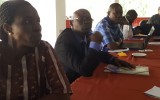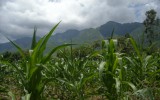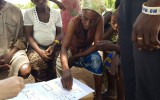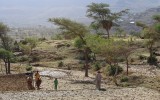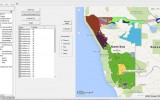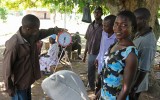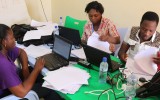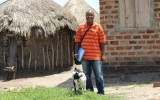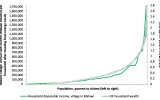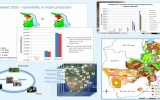Data
Showing items 1 to 12 of 12
View Categories
- Areas of expertise
- Capacity building
- Climate change
- Data
- Disasters and emergencies
- Famine prevention and food security
- Gender
- Income diversification
- Inequality
- Lake Victoria fisheries
- Livelihood resilience
- Livelihood Zones
- Livelihoods
- Monitoring and evaluation
- Nutrition and health
- Open source
- Policy and programme design
- Post-conflict
- Poverty research
- Refugees and displacement
- Social protection
- Technology
- Urban
- Vulnerability assessment
- Countries
- Hydromet
- Methods
- Resilience
- The organisation
-
Imagine all the snows of Mount Kilimanjaro had melted
At the HyCRISTAL AGM in Kampala last month, climate change researchers were talking about 40-year horizons, where we did an exercise in small groups to each imagine the consequences of one of a list of possible scenarios. We were given our scenario and asked to work back to what we would have to do now, […]
-
How new technologies can make a difference to rural smallholder farmers.
Some of you may have seen this piece on the BBC about “How missing weather data is a ‘life and death’ issue”. It’s about tech start-up Kukua, and the weather stations they have installed in Tanzania to help provide local commercial farmers with better forecasts. Kukua is a business with a rather unusual business model: […]
-
Considering the health sector as an important user of Hydromet information
In September, I was able to attend the AMCOMET, African Ministerial Conference on Meteorology, forum in Addis Ababa. The focus of the forum was Weather, Water, and Climate Services, and the contribution of these ‘hydromet’ services to wider social and economic development is becoming increasingly evident as the reality of climate change hits both urban […]
-
Measuring resilience to climate change in the Lake Victoria basin
Just over a year ago the UK Department for International Development (DfID), with the Natural Environment Research Council (NERC) launched its ‘Future Climate for Africa’ (FCFA) project. This £20 million project, involving five research consortia, aims to “generate fundamentally new climate science focused on Africa, and to ensure that this science has an impact on […]
-
Banking on Evidence for Development – a month in the life of a volunteer
It’s August 2013 and I’m about as broke as a ‘banker’ in London can be. I had eagerly taken up my first position in the big city: interning at RBS’ risk department. That’s right, I had made it to the big time… And then rent happened… And bills… So with accrued holiday time but no […]
-
New HEA software developed by Evidence for Development
The household economy approach (HEA) is a method for assessing the vulnerability of rural populations to economic shocks and changes, based on their livelihood patterns and market information. It is now widely used as a method of famine early warning by many governments and humanitarian agencies, and also has important applications for managing the impacts […]
-
Six challenges and opportunities for a better post-2015 development data revolution
The data revolution in international development continues to draw attention and take shape as the third annual International Conference on Financing for Development approaches in Addis Ababa this July. At Evidence for Development, the pursuit of strong data and baselines for programme design, monitoring and evaluation is central to our work in measuring and supporting […]
-
Mobile data, measurement & evidence… what’s new?
As mobile data collection in remote regions and developing countries becomes more viable for development organisations, the robustness of the methodologies used must be considered in relation to the goal of evidence-based development. Expanded possibilities According to the UN International Telecommunication Union, “by the end of 2014, 55% of all mobile-broadband subscriptions are expected to […]
-
The Household Economy Approach: Managing the impact of climate change on poverty and food security in developing countries (2014)
Also available at: http://www.sciencedirect.com/science/article/pii/S221209631400031X
-
Oiling the relationship between evidence and policy: prioritising data quality and integrity
LSE’s recent JSRP conference on politics and evidence in international development highlighted problems inherent in the ways ‘evidence’ tends to be defined and used in mainstream development discourse and practice. How can Evidence for Development’s individual household method (IHM) and current involvement in the ‘Assessing Rural Transformations’ project inform the discussion and help to oil […]
-
For richer, for poorer… inequality curves now look similar in the UK and rural Africa
Idly scanning the pages of the Observer on Sunday morning, this graphic caught my eye in Will Hutton’s article about inequality in Britain. Evidence for Development has a large collection of individual household income data from some of the poorest countries in Africa, and Hutton’s chart on wealth inequality in the UK reminded me […]
-
Big data, climate change and developing economies: predictive modeling for improved lives
I did my first, and possibly last, Ignite talk at Strata London recently. If you don’t know the format it goes like this: 5 minutes, 20 slides; the slides automatically advance every 15 seconds and you have to tell your story and finish on time. The story I was telling wasn’t about Acunu, nor even […]
